外研版八年级上册Module 11Way of life Unit 3-1教学课件(共20张PPT)
文档属性
| 名称 | 外研版八年级上册Module 11Way of life Unit 3-1教学课件(共20张PPT) | 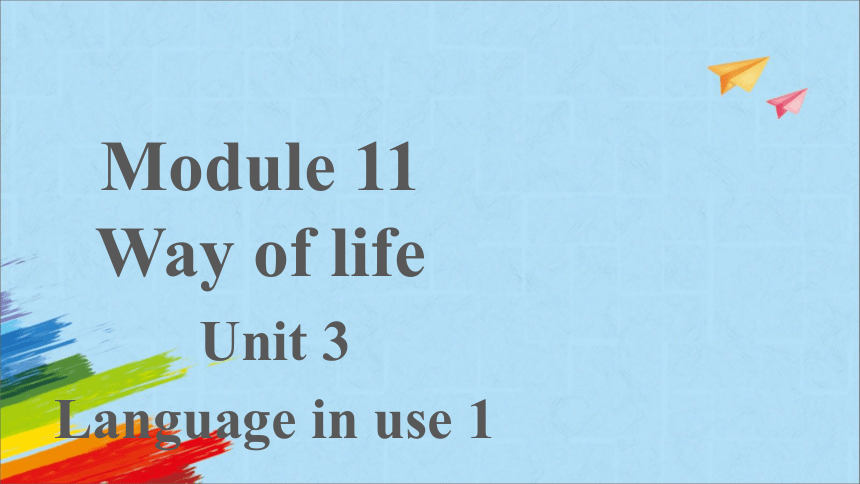 | |
| 格式 | pptx | ||
| 文件大小 | 3.4MB | ||
| 资源类型 | 教案 | ||
| 版本资源 | 外研版 | ||
| 科目 | 英语 | ||
| 更新时间 | 2022-10-14 21:15:06 | ||
图片预览

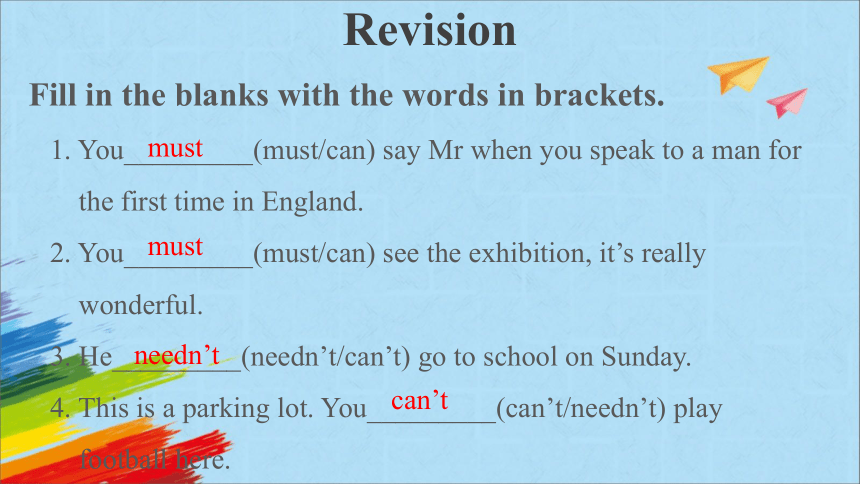
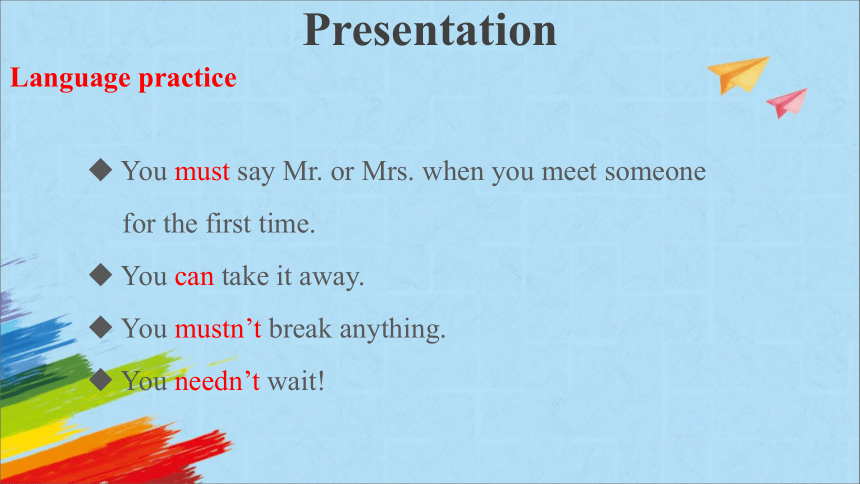
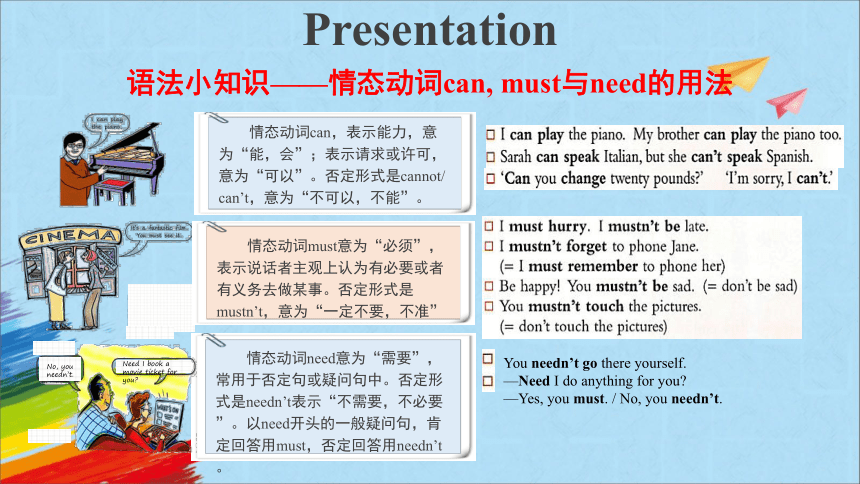
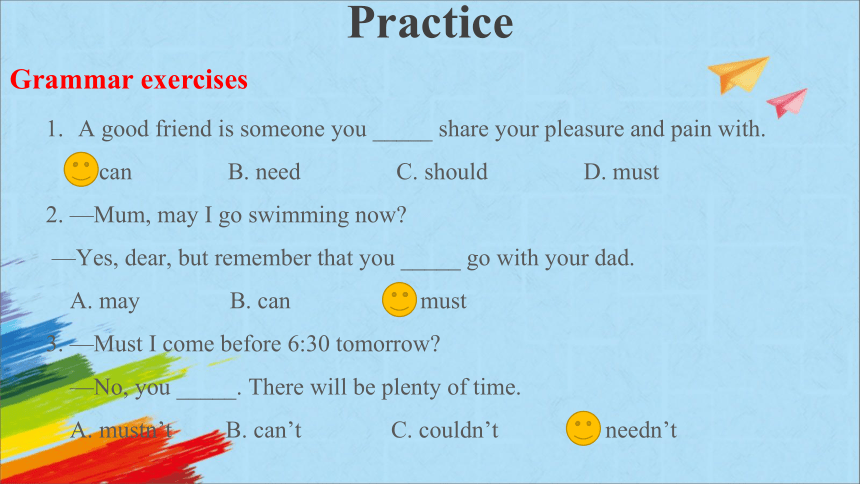
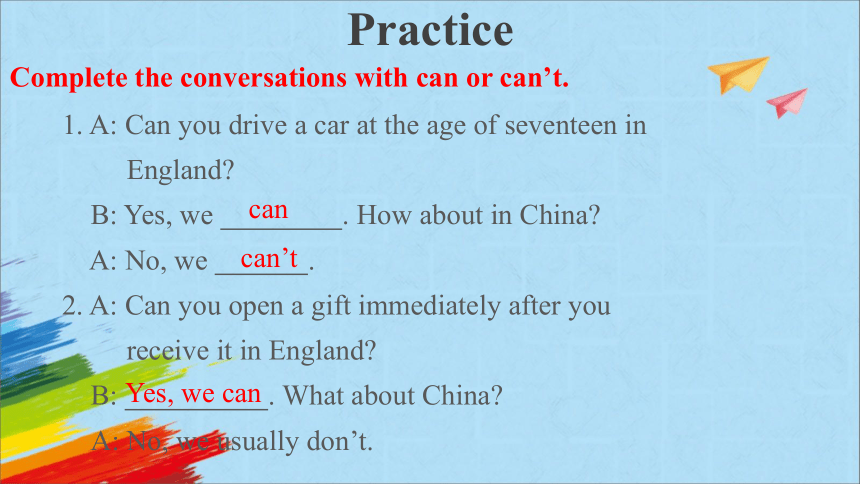
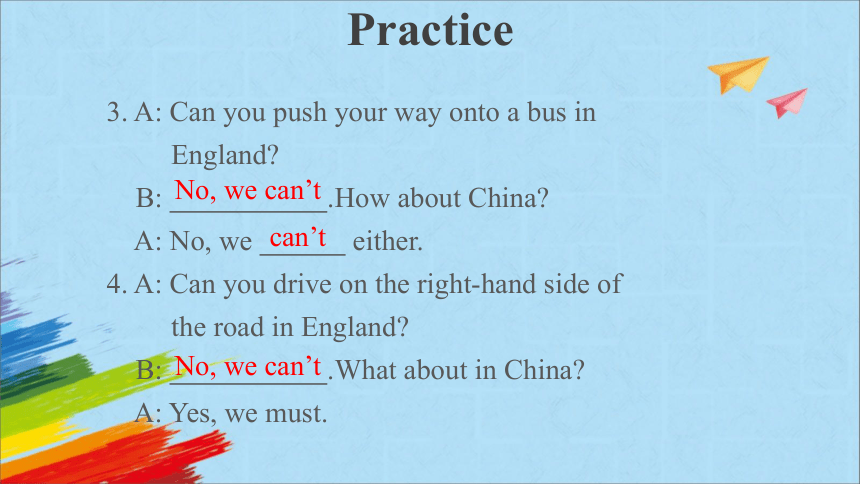
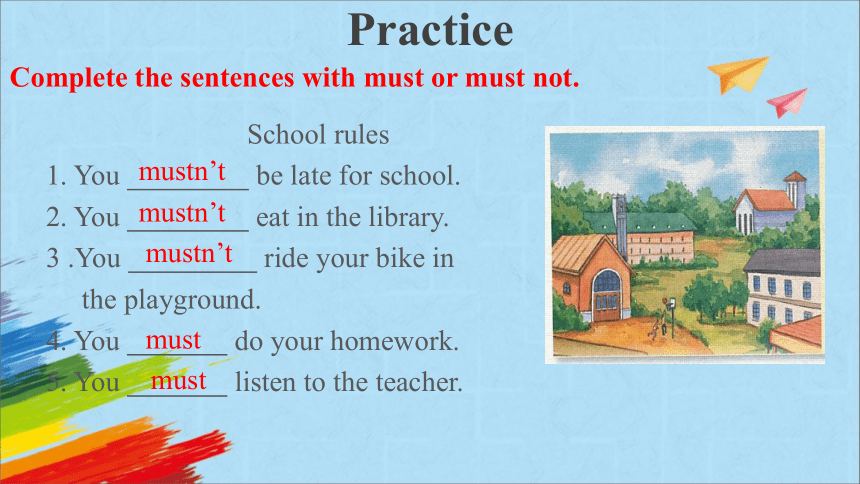
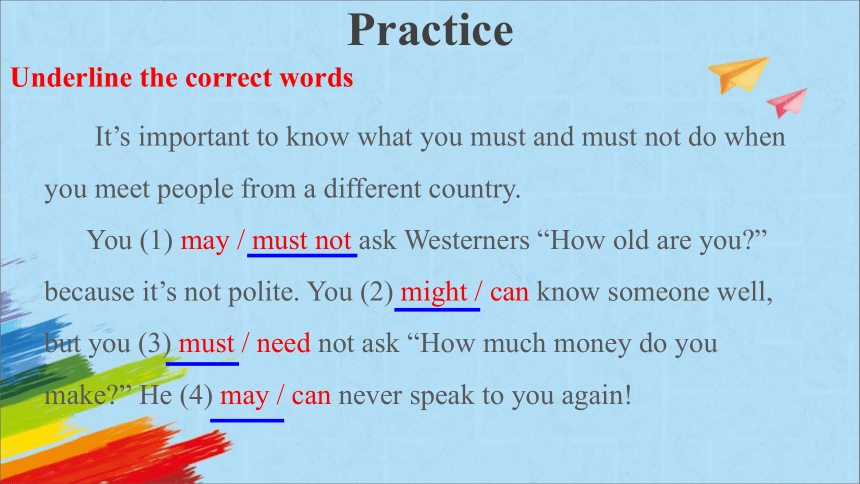
文档简介
(共20张PPT)
Module 11
Way of life
Unit 3
Language in use 1
Revision
Fill in the blanks with the words in brackets.
1. You_________(must/can) say Mr when you speak to a man for
the first time in England.
2. You_________(must/can) see the exhibition, it’s really
wonderful.
3. He_________(needn’t/can’t) go to school on Sunday.
4. This is a parking lot. You_________(can’t/needn’t) play
football here.
must
must
needn’t
can’t
You must say Mr. or Mrs. when you meet someone
for the first time.
You can take it away.
You mustn’t break anything.
You needn’t wait!
Presentation
Language practice
语法小知识——情态动词can, must与need的用法
情态动词can,表示能力,意为“能,会”;表示请求或许可,意为“可以”。否定形式是cannot/
can’t,意为“不可以,不能”。
情态动词must意为“必须”,表示说话者主观上认为有必要或者有义务去做某事。否定形式是mustn’t,意为“一定不要,不准”。
情态动词need意为“需要”,常用于否定句或疑问句中。否定形式是needn’t表示“不需要,不必要”。以need开头的一般疑问句,肯定回答用must,否定回答用needn’t。
You needn’t go there yourself.
—Need I do anything for you
—Yes, you must. / No, you needn’t.
Need I book a movie ticket for you
No, you needn’t.
Presentation
A good friend is someone you _____ share your pleasure and pain with.
A. can B. need C. should D. must
2. —Mum, may I go swimming now
—Yes, dear, but remember that you _____ go with your dad.
A. may B. can C. must
3. —Must I come before 6:30 tomorrow
—No, you _____. There will be plenty of time.
A. mustn’t B. can’t C. couldn’t D. needn’t
Practice
Grammar exercises
1. A: Can you drive a car at the age of seventeen in
England
B: Yes, we . How about in China
A: No, we .
2. A: Can you open a gift immediately after you
receive it in England
B: . What about China
A: No, we usually don’t.
can
can’t
Yes, we can
Practice
Complete the conversations with can or can’t.
3. A: Can you push your way onto a bus in
England
B: .How about China
A: No, we either.
4. A: Can you drive on the right-hand side of
the road in England
B: .What about in China
A: Yes, we must.
No, we can’t
can’t
No, we can’t
Practice
School rules
1. You be late for school.
2. You eat in the library.
3 .You ride your bike in
the playground.
4. You do your homework.
5. You listen to the teacher.
mustn’t
mustn’t
mustn’t
must
must
Practice
Complete the sentences with must or must not.
It’s important to know what you must and must not do when you meet people from a different country.
You (1) may / must not ask Westerners “How old are you ” because it’s not polite. You (2) might / can know someone well, but you (3) must / need not ask “How much money do you make ” He (4) may / can never speak to you again!
Practice
Underline the correct words
In public places, you (5) must / can ask people before you take photos of them, and you (6) must not / might not eat or drink in shops or museums.
In some countries you (7) cannot / can go into someone’s house with your shoes on. You (8) need not / must not take them off. But in some other countries you (9) might / must not wear shoes in the house.
Practice
Practice
Listen to a teenager talking about his life. Check (√) the things he must or mustn’t do.
must mustn’t
1. clean up bedroom once a week
2. wash up after dinner
3. stay out after 9 pm
4. do homework before going out
5. wash hands before dinner
6. play music loudly after 10 pm
√
√
√
√
√
√
Practice
1. __________________________________________
2. ___________________________________________
He can go out with his friends at weekends.
He can play music loudly before ten o’clock at night.
Practice
Listen again. What two things does he say he can do
I can … I must … I must not …
I can watch TV when I come home from school.
I must help around the house, for example, do the washing up.
I must not go to bed late.
…
Practice
Write some things you can, must and must not do at home.
— I must visit my grandparents once a week.
I mustn’t stay up late in the evening.
— …
Now work in pairs. Tell each other three things you must do at home and three things you mustn’t do. Are your home rules different or the same
Practice
baseball cap chess set chopsticks dictionary presents
1. Use your __________ to look up any words you do not understand.
2. Most Chinese people eat noodles with __________.
dictionary
chopsticks
Practice
Complete the sentences with the words or expressions in the box.
3. Jenny could not wait to open her birthday __________.
4. He thinks it’s cool to wear his ___________ back-to-front.
5. Where’s my __________ Let’s play a game.
presents
baseball cap
chess set
baseball cap bike chess set chocolate chopsticks dictionary fish and chips litter photo video game
Play a game. Choose a word or an expression from the box and describe it to the class. The class guesses what it is.
Production
A: Many people have one.
B: Is it a chess set
A: No. You use it to get to places.
C: Is it a bike
A: Yes.
1. must表示“必须,一定要”,可用于肯定句、否定句和疑问句。
否定形式是must not (mustn’t)表示“不能、禁止”的意思。
2. can表示许可,可以,可用于肯定句、否定句及疑问句。否定形
式是cannot(can’t)表示不能,不可以,语气弱于mustn’t。
3. need做情态动词表示需要,可用于肯定句、否定句及疑问句。
否定形式need not (needn't) 比较常用,表示不需要或不必要。
need也可以作行为动词,表示需要常用于need to do sth结构。
Summary
Grammar: modal words (must, can, need的用法)
1. Read more materials about foreign culture and customs.
2. Try to recite all the new words in this unit.
Homework
Goodbye!
Module 11
Way of life
Unit 3
Language in use 1
Revision
Fill in the blanks with the words in brackets.
1. You_________(must/can) say Mr when you speak to a man for
the first time in England.
2. You_________(must/can) see the exhibition, it’s really
wonderful.
3. He_________(needn’t/can’t) go to school on Sunday.
4. This is a parking lot. You_________(can’t/needn’t) play
football here.
must
must
needn’t
can’t
You must say Mr. or Mrs. when you meet someone
for the first time.
You can take it away.
You mustn’t break anything.
You needn’t wait!
Presentation
Language practice
语法小知识——情态动词can, must与need的用法
情态动词can,表示能力,意为“能,会”;表示请求或许可,意为“可以”。否定形式是cannot/
can’t,意为“不可以,不能”。
情态动词must意为“必须”,表示说话者主观上认为有必要或者有义务去做某事。否定形式是mustn’t,意为“一定不要,不准”。
情态动词need意为“需要”,常用于否定句或疑问句中。否定形式是needn’t表示“不需要,不必要”。以need开头的一般疑问句,肯定回答用must,否定回答用needn’t。
You needn’t go there yourself.
—Need I do anything for you
—Yes, you must. / No, you needn’t.
Need I book a movie ticket for you
No, you needn’t.
Presentation
A good friend is someone you _____ share your pleasure and pain with.
A. can B. need C. should D. must
2. —Mum, may I go swimming now
—Yes, dear, but remember that you _____ go with your dad.
A. may B. can C. must
3. —Must I come before 6:30 tomorrow
—No, you _____. There will be plenty of time.
A. mustn’t B. can’t C. couldn’t D. needn’t
Practice
Grammar exercises
1. A: Can you drive a car at the age of seventeen in
England
B: Yes, we . How about in China
A: No, we .
2. A: Can you open a gift immediately after you
receive it in England
B: . What about China
A: No, we usually don’t.
can
can’t
Yes, we can
Practice
Complete the conversations with can or can’t.
3. A: Can you push your way onto a bus in
England
B: .How about China
A: No, we either.
4. A: Can you drive on the right-hand side of
the road in England
B: .What about in China
A: Yes, we must.
No, we can’t
can’t
No, we can’t
Practice
School rules
1. You be late for school.
2. You eat in the library.
3 .You ride your bike in
the playground.
4. You do your homework.
5. You listen to the teacher.
mustn’t
mustn’t
mustn’t
must
must
Practice
Complete the sentences with must or must not.
It’s important to know what you must and must not do when you meet people from a different country.
You (1) may / must not ask Westerners “How old are you ” because it’s not polite. You (2) might / can know someone well, but you (3) must / need not ask “How much money do you make ” He (4) may / can never speak to you again!
Practice
Underline the correct words
In public places, you (5) must / can ask people before you take photos of them, and you (6) must not / might not eat or drink in shops or museums.
In some countries you (7) cannot / can go into someone’s house with your shoes on. You (8) need not / must not take them off. But in some other countries you (9) might / must not wear shoes in the house.
Practice
Practice
Listen to a teenager talking about his life. Check (√) the things he must or mustn’t do.
must mustn’t
1. clean up bedroom once a week
2. wash up after dinner
3. stay out after 9 pm
4. do homework before going out
5. wash hands before dinner
6. play music loudly after 10 pm
√
√
√
√
√
√
Practice
1. __________________________________________
2. ___________________________________________
He can go out with his friends at weekends.
He can play music loudly before ten o’clock at night.
Practice
Listen again. What two things does he say he can do
I can … I must … I must not …
I can watch TV when I come home from school.
I must help around the house, for example, do the washing up.
I must not go to bed late.
…
Practice
Write some things you can, must and must not do at home.
— I must visit my grandparents once a week.
I mustn’t stay up late in the evening.
— …
Now work in pairs. Tell each other three things you must do at home and three things you mustn’t do. Are your home rules different or the same
Practice
baseball cap chess set chopsticks dictionary presents
1. Use your __________ to look up any words you do not understand.
2. Most Chinese people eat noodles with __________.
dictionary
chopsticks
Practice
Complete the sentences with the words or expressions in the box.
3. Jenny could not wait to open her birthday __________.
4. He thinks it’s cool to wear his ___________ back-to-front.
5. Where’s my __________ Let’s play a game.
presents
baseball cap
chess set
baseball cap bike chess set chocolate chopsticks dictionary fish and chips litter photo video game
Play a game. Choose a word or an expression from the box and describe it to the class. The class guesses what it is.
Production
A: Many people have one.
B: Is it a chess set
A: No. You use it to get to places.
C: Is it a bike
A: Yes.
1. must表示“必须,一定要”,可用于肯定句、否定句和疑问句。
否定形式是must not (mustn’t)表示“不能、禁止”的意思。
2. can表示许可,可以,可用于肯定句、否定句及疑问句。否定形
式是cannot(can’t)表示不能,不可以,语气弱于mustn’t。
3. need做情态动词表示需要,可用于肯定句、否定句及疑问句。
否定形式need not (needn't) 比较常用,表示不需要或不必要。
need也可以作行为动词,表示需要常用于need to do sth结构。
Summary
Grammar: modal words (must, can, need的用法)
1. Read more materials about foreign culture and customs.
2. Try to recite all the new words in this unit.
Homework
Goodbye!
同课章节目录
- Module 1 How to learn English
- Unit 1 Let's try to speak English as much as possi
- Unit 2 You should smile at her.
- Unit 3 Language in use .
- Module 2 My home town and my country
- Unit 1 It's taller than many other buildings.
- Unit 2 Cambridge is a beautiful city in the east o
- Unit 3 Language in use .
- Module 3 Sports.
- Unit 1 Nothing is more exciting than playing tenni
- Unit 2 This year we training more carefully.
- Unit 3 Language in use .
- Module 4 Planes, ships and trains .
- Unit 1 He lives the farthest from school.
- Unit 2 What is the best way to travel.
- Unit 3 Language in use .
- Module 5 Lao She Teahouse.
- Unit 1 I wanted to see the Beijing Opera.
- Unit 2 It descibes the changes in Chinese society.
- Unit 3 Language in use .
- Module 6 Animals in danger.
- Unit 1 It allows people to get closer to them .
- Unit 2 The WWF is working hard to save them all.
- Unit 3 Language in use .
- Revision module A
- Module 7 A famous story
- Unit 1 Alice was sitting with her sister by the ri
- Unit 2 She was thinking about her cat.
- Unit 3 Language in use .
- Module 8 Accidents
- Unit 1 While the car were changing to red, a car s
- Unit 2 I was trying to pick it up when it bite me
- Unit 3 Language in use .
- Module 9 Population
- Unit 1 The population of China is about 1.37 billi
- Unit 2 Arnwick was a city with 200,000 people.
- Unit 3 Language in use .
- Module 10 The weathe
- Unit 1 It might snow.
- Unit 2 The weather is fine all year round.
- Unit 3 Language in use .
- Module 11 Way of life
- Unit 1 In China ,we open a gift later.
- Unit 2 In England, you usually drink tea with milk
- Unit 3 Language in use .
- Module 12 Help
- Unit 1 What should we do before help arrives?
- Unit 2 Stay away from windows and heavy furniture.
- Unit 3 Language in use .
- Revision module B
